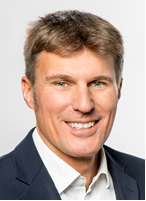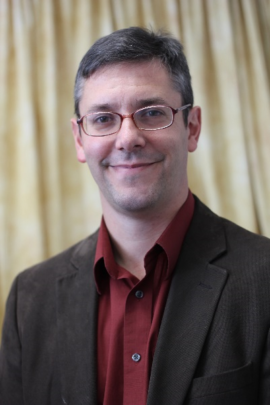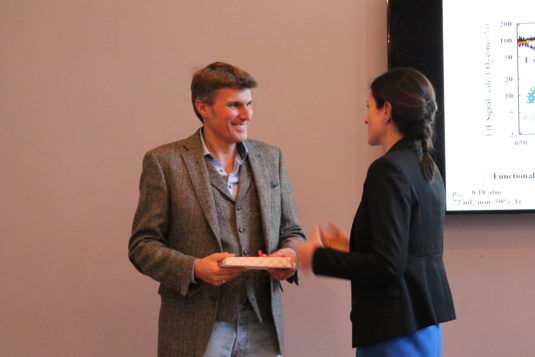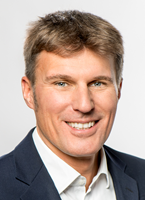The MCEC Management Team is happy to announce that Prof. Karsten Reuter (Chair for Theoretical Chemistry and Catalysis Research Center, Technical University of Munich) is recipient of the third MCEC Lectureship.
This coming May, he will visit different MCEC research groups, give scientific lectures and participate in scientific discussions.
In Utrecht, a combined lecturing program will be organized, which will also include a lecture from Prof. George Huber (Richard Antoine and Dororthy O’Brien Professor of Chemical Engineering at University of Wisconsin-Madison), who will visit Utrecht at the same time.
All lectures are open to both MCEC members and all other people interested; registration is not required. Also, PhD lectures will be organized in Eindhoven and Utrecht for all MCEC PhDs and PDs.
Program:
Wednesday 15 May – Eindhoven University of Technology
13.30 – 16.00
PhD short lectures (working in multiscale modelling) with informal discussions
location: Helix, STW 3.46
16.00 – 17.00
A Look through the Operando Glass: First-Principles Based Multiscale Modeling of Working Catalysts
Location: Helix, STC 0.01
Monday 20 May – Utrecht Science Park
10.00 – 12.00
Lecture 1 Karsten Reuter:
Knowledge-Based Approaches in Catalysis and Energy Modelling
Location: David de Wied Building, room: 1.22
Tuesday 21 May – Utrecht Science Park
Location: Minnaert Building, Mezzanine room
9.30 – 10.30
Lecture George Huber:
The Quest for Technologies for the Production of Sustainable Fuels and Chemicals from Biomass
11.00 – 12.00
Lecture 2. Karsten Reuter:
A Look through the Operando Glass: First-Principles Based Multiscale Modeling of Working Catalysts
12.00
Joint Lunch
Wednesday 22 May – Utrecht Science Park
This day, Karsten Reuter is available for discussions about possible collaborations.
Thursday 23 May – Utrecht Science Park
Location: David de Wied Building, room: M.201
9.45 – 15.00
PhD short lectures with informal discussions
(under guidance of Prof. Karsten Reuter)
9.45
Welcome Coffee
10.00 – 10.10
Opening Prof. Karsten Reuter
10.10 – 10.30
Pitch 1: Ellen Sterk
Support, Alloying and Promoter Effects and Active Sites in CO2 Hydrogenation
10.30 – 10.50
Pitch 2: Michael Jenks
Catalytic conversion of municipal waste
10.50 – 11.10
Pitch 3: Jochem van Duin
A multiscale Catalysis and Engineering Approach to CO2-to-X
11.10 – 11.30
Short Break
11.30 – 11.50
Pitch 4: Rafael Mayorga González
Exploring the Complexity of Pore Space of a Catalyst Particle
11.50 – 12.10
Pitch 5: Romy Riemersma
Studying the Genesis of Nanobubbles on Zeolite and Metal Organic Framework Thin-Films by Scanning Probe Microscopy
12.10 – 12.30
Pitch 6: Joris Koek
Quantitative Determination of Particle-Size Dependent Active Sites in Supported Metal Nanoparticles with SHINERS
12.30 – 13.00
Lunch
13.00 – 13.20
Pitch 7: Christia Jabbour
Chemical imaging of solid catalysts with Nano-IR spectroscopy
13.20 – 13.40
Pitch 8: Jeddeo O’connor
Catalysis by Metal-based Zeolites for Bulk Chemicals Synthesis from Carbon Dioxide and Renewably Resourced Hydrogen
13.40 – 14.00
Pitch 9: Thomas van Swieten
Nanoprobes for high resolution spatial and temporal temperature mapping
14.00 – 14.20
Pitch 10: Mark Mangnus
Tracking diffusion with luminescent perovskite nanosensors
14.20 – 14.30
Closing
About Prof. Karsten Reuter
 Prof. Karsten Reuter’s (b. 1970) research activities focus on a quantitative modeling of materials properties and functions. He specifically works on multiscale models that combine predictive-quality first-principles techniques with coarse-grained methodologies to achieve microscopic insight into the processes in working catalysts and energy conversion devices. For this, he unites methods and concepts from the disciplines of physics and chemistry as well as materials science and engineering.
Prof. Karsten Reuter’s (b. 1970) research activities focus on a quantitative modeling of materials properties and functions. He specifically works on multiscale models that combine predictive-quality first-principles techniques with coarse-grained methodologies to achieve microscopic insight into the processes in working catalysts and energy conversion devices. For this, he unites methods and concepts from the disciplines of physics and chemistry as well as materials science and engineering.
Karsten did his doctoral studies on theoretical surface physics in Erlangen, Madrid and Milwaukee. Following research experiences at the Fritz Haber Institute of the Max Planck Society (MPG) in Berlin and the FOM Institute in Amsterdam, he headed an independent MPG junior research group.
Since 2009 he holds the Chair for Theoretical Chemistry at the Technical University of Munich (TUM). He recently held visiting professorships at Stanford (2014) and the Massachusetts Institute of Technology (2018), and is the coordinator of the Munich Cluster of Excellence e-conversion.
About Prof. George Huber
 George W Huber is the Richard Antoine and Dororthy O’Brien Professor of Chemical Engineering at University of Wisconsin-Madison. His research focus is on developing new catalytic processes for the production of renewable liquid fuels and chemicals.
George W Huber is the Richard Antoine and Dororthy O’Brien Professor of Chemical Engineering at University of Wisconsin-Madison. His research focus is on developing new catalytic processes for the production of renewable liquid fuels and chemicals.
He has received several awards including the AICHE Colburn award, the Thomson Reuters highly cited researcher award, the Camille Dreyfus Teacher-Scholar award, and the NSF career award. He is co-founder of of two startup companies Anellotech (www.anellotech.com) and Pyran, which are both focused on commercializing technologies he developed in his laboratory that convert biomass into different fuels and chemicals.
In summer of 2015, George did a sabbatical visit with Professor Tao Zhang at Dalian Institute of Chemical Physics. George did a post-doctoral stay with Avelino Corma at the Technical Chemical Institute at the Polytechnical University of Valencia, Spain (UPV-CSIC). He obtained his Ph.D. in Chemical Engineering from University of Wisconsin-Madison (2005) under the direction of James Dumesic. He obtained his B.S. (1999) and M.S.(2000) degrees in Chemical Engineering from Brigham Young University where he studied under the direction of Calvin Bartholomew.
George has published over 160 peer-reviewed publications that have been cited over 28,000 times and has over 19 patents/patent applications.
Interview Prof. Karsten Reuter
In 2017, Karsten Reuter was one of the speakers at the MCEC mini-symposium. He was interviewed by MCEC PhDs Jeroen Vollenbroek and Anne-Eva Nieuwelink about his background and interest in theoretical chemistry, and the unavoidable change from fossil towards renewable sources:

“Very soon we will be able to sustainably produce certain base fuels at costs lower than through fossil resources. This will be the key moment, because then we will stop burning something as precious as oil, which in itself generates big problems because of the huge amounts of fuel that we need. So here we have this very valuable chemical and what do we do? We burn it. I think it’s unavoidable that the situation will change in the next ten years.” Read the full interview here.
